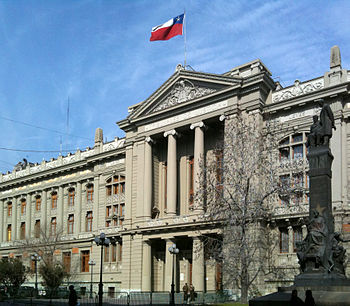This article needs additional citations for verification. (December 2013) |
 |
|---|
|
|

The judiciary of the Republic of Chile includes one Supreme Court, one Constitutional Court, 17 Courts of Appeal, 84 Oral Criminal Tribunals and Guarantee Judges; 7 Military Tribunals; over 300 Local Police Courts; and many other specialized Tribunals and courts in matter of family, labor, customs, taxes, electoral affairs, etc.
The law provides for an independent judiciary, and the government generally respected this provision in practice.[1]
Chile's legal system is civil law based. It is primarily based on the Chilean Civil Code of 1855, derived from Spanish law and other codes of Continental Europe of the 19th century.
Chilean process provides for a very limited judicial review of legislative acts in the Constitutional Court. It does not accept compulsory International Court of Justice (ICJ) jurisdiction.[2]
From the year 2000 onwards, Chile completely overhauled its criminal justice system with the implementation of a new, German-inspired, adversarial system, gradually implemented throughout the country, with the final stage of implementation in the Santiago Metropolitan Region completed on June 16, 2005.
On 4 September 2013, a week before the 40th anniversary of the coup that brought General Pinochet to power, the National Association of Magistrates of the Judiciary apologised for abandoning its role in protecting basic rights during Chile's military rule in the 1970s and 1980s.[3]
- ^ Report on Human Rights Practices 2006: Chile. United States Bureau of Democracy, Human Rights, and Labor (March 6, 2007). This article incorporates text from this source, which is in the public domain.
- ^ "Chile". Central Intelligence Agency.
- ^ Chile's judges apologise for their actions after coup, 4 September 2013, BBC
© MMXXIII Rich X Search. We shall prevail. All rights reserved. Rich X Search
